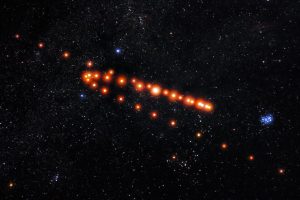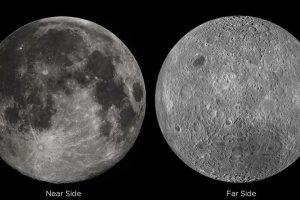
By Sinwan Basharat, Canada
On a seemingly ordinary Thursday afternoon last month, a few dozen scientists in Southern California were affixed to a large screen in front of them. Clad in navy blue face masks, the mark of life in a global pandemic, these scientists were watching the live landing of Perseverance, NASA’s latest rover sent to Mars. As the rover successfully parachuted and landed on to the surface of Mars on the afternoon of February 18, 2021, it sent waves of excitement and jubilation across the world. [1] While earlier rover missions have been monumental in their own right, the successful landing of Perseverance marks the beginning of a truly historic mission. [2]

Perseverance landed on a site called the Jezero Crater, which may be an ancient lakebed on Mars (‘Jezero’ means lake in several Slavic languages). [3] Scientists believe that more than 3.5 billion years ago, the site may have been gushing with water and flourishing with microorganisms. [4] Along with analyzing Mars’ climate and geological characteristics, Perseverance is tasked with collecting soil samples from the site that may provide clues to the existence of ancient microbial life. [2] This mission is historic because for the first time ever, the samples Perseverance is collecting will be retrieved and sent back to Earth in a subsequent mission. [1] [2] Undoubtedly, it is the most significant mission to date that may shed light about the existence of current or previous extra-terrestrial life.
Furthermore, by analyzing soil samples that may have allowed for life to exist on Mars, scientists believe it may help to understand the fundamental origins of life. The analysis may provide insights into the geological, chemical, and physical conditions that created the initial spark for life on our own planet. [5] Remarkably, 1400 years ago, Allah not only revealed that this line of scientific inquiry is possible but may even have exhorted humans to pursue it as an approach to understand the origins of creation.
An exhortation of the Holy Qur’an
In the Holy Qur’an, a particular phrase, ‘travel in the earth (or land)’ has been used in several places, including, 6:12; 12:110; 29:21; 30:10; 35:45; 40:83. In nearly all of these occurrences, it is followed by another phrase describing the fate of previous nations and civilizations who rejected the message of God and His Messengers.
However, in one verse, a slightly different perspective is also provided. Allah says:
قُلۡ سِيرُواْ فِي ٱلۡأَرۡضِ فَٱنظُرُواْ كَيۡفَ بَدَأَ ٱلۡخَلۡقَۚ
‘Say, ‘Travel in the earth (or land), and see how He originated the creation…’ [6]
In this particular verse, Allah has given a directive that by travelling across land and visiting other places, it will be possible to gain a better understanding about the origins of creation. While the Arabic word, ارض (Ardh), is commonly used to describe our planet, the Earth (capital E), it can also be used to generally describe land, soil, a carpet, and a floor among several other meanings. [7] As such, the word Ardh is not necessarily restrictive to the Earth, but in this particular verse, may also refer to land or surfaces on other celestial bodies.
It is possible that when Allah revealed this verse over 1400 years ago, He provided an exhortation to future scientists that one of the ways to understand the origins of life and creation (including inanimate creation) would be to travel across lands on other planets. A remarkable and extraordinary insight indeed, when at that time, humans did not yet even know the full scale of land across our own planet.
Lord of all the Worlds
The Promised Messiah (as) has also explained that the Holy Qur’an provides a vast outlook on the concept of God’s dominion. It is not restricted to our planet, but rather extends to the entire universe. In the Holy Quran, the concept of life on other planets is not ruled out, in fact, it is categorically emphasized. The Promised Messiah (as) explains in his book, Noah’s Ark, that the attribute of God being Rabb-ul-Alamin or ‘Lord of all the Worlds’, described in the very first Surah of the Holy Qur’an, indicates that God is the Creator and Sustainer of all habitations, creations, bodies, and souls. Explaining further, the Promised Messiah (as) writes that,
‘The compound Rabb-ul-Alamin is such a complete term that even if it was discovered that other habitats existed within the celestial bodies elsewhere, they too would be encompassed by this.’ [8]
Today, as Perseverance traverses across Mars collecting samples, it is also sending high resolution images of the red planet back to Earth. For humanity, those images garner excitement, admiration, and a sense of wonder. For a Muslim, the images also reaffirm a conviction in the wisdom and insight of the Holy Qur’an. Moreover, be it millions of kilometres away or mere steps away, one can’t help but feel gratitude because Allah is the Lord of all places, He is the Lord of all the Worlds.
About the Author: Sinwan Basharat is a researcher with a background in molecular genetics and epidemiology. He works for a research agency in Ottawa, Canada. He also serves as a Deputy Editor for the Science Section in The Review of Religions.
ENDNOTES
[1] NASA. Touchdown! NASA’s Mars Perseverance Rover Safely Lands on Red Planet | NASA. (2021). Available at: https://www.nasa.gov/press-release/touchdown-nasas-mars-perseverance-rover-safely-lands-on-red-planet. (Accessed: 19th March 2021)
[2] Witze, A. Touch down! NASA’s Mars landing sparks new era of exploration. Nature 590, 535–537 (2021).
[3] Dragana Jovanovic & Catherine Thorbecke. Bosnian village with same name as Mars landing site celebrates NASA’s success – ABC News. ABC News(2021). Available at: https://abcnews.go.com/International/bosnian-village-mars-landing-site-celebrates-nasas-success/story?id=75997229. (Accessed: 19th March 2021)
[4] NASA. NASA’s Mars 2020 Will Hunt for Microscopic Fossils. (2019). Available at: https://mars.nasa.gov/news/8549/nasas-mars-2020-will-hunt-for-microscopic-fossils/. (Accessed: 19th March 2021)
[5] Sasselov, D. D., Grotzinger, J. P. & Sutherland, J. D. The origin of life as a planetary phenomenon. Sci. Adv.6, (2020).
[6] The Holy Qur’an, (29:21)
[7] Ghulam, M. F. Dictionary of the Holy Quran. (Islam International Publications Ltd, 2006).
[8] Hazrat Mirza Ghulam Ahmad (as), Noah’s Ark – An Invitation to Faith. (Islam International Publications Ltd, 1902), 68.




Add Comment